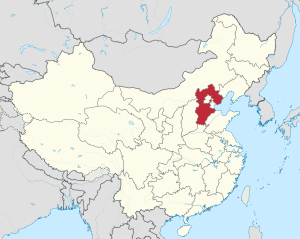Hebei facts for kids
Hebei (which means "North of the River" in Chinese) is a large province in China. It completely surrounds the important cities of Beijing and Tianjin. These two cities are special because they are "municipalities" directly controlled by the central government, like big, independent cities. Shijiazhuang is the capital city of Hebei.
Hebei is located in northern China. It shares borders with several other provinces and regions. To the northeast, it borders Liaoning province. To the north, it touches Inner Mongolia. On its west side, you'll find Shanxi province. To the south, it borders Henan province, and to the southwest, it borders Shandong province.
The short name for Hebei is "Ji" (冀). This helps avoid confusion with another province called Henan, which also has "He" in its name. Because Hebei wraps around Beijing and Tianjin, these three areas are often grouped together. They are called Jingjinji, where "Jing" stands for Beijing, "Jin" for Tianjin, and "Ji" for Hebei. This shows how closely connected they are.
Contents
History of Hebei Province
Hebei became a province in 1928. Before that, it was known as Chihli or Zhili. This older name meant "directly administered." It referred to how the area was managed during the Qing dynasty, which was a long time ago. The central government directly controlled this region.
Geography and Climate
Hebei province has a varied landscape. It includes parts of the North China Plain, which is a large, flat area. It also has mountains, especially in the western and northern parts. The climate in Hebei changes a lot with the seasons. Summers can be hot and rainy, while winters are usually cold and dry. This mix of flat land and mountains means Hebei has different types of natural environments.
Important Places to See
Hebei is home to many interesting historical sites and natural wonders.
The Great Wall of China
Parts of the famous Great Wall of China run through Hebei province. One well-known section is at Jinshanling. These ancient walls were built to protect China. They offer amazing views and a chance to learn about ancient Chinese history.
Mountain Resorts and Temples
The Chengde Mountain Resort is a UNESCO World Heritage site in Hebei. It was a summer palace for emperors. The Putuo Zongcheng Temple in Chengde, built in 1771, is also very impressive. It looks a bit like the Potala Palace in Tibet. There are also ancient pagodas, like the Lingxiao Pagoda and the Xumi Pagoda in Zhengding. These old buildings show the rich history and architecture of the region.
Natural Beauty
Hebei also has beautiful natural spots. Langyashan, also known as Wolf Tooth Mountain, is a scenic mountain area. The Bashang Meadows in Fengning County are vast grasslands. They are popular for their natural beauty, especially in warmer months.
Culture and Food
Hebei has a rich culture, influenced by its long history. The local food is also quite famous. One unique dish is the Hejian-styled donkey burger. It's a type of sandwich with donkey meat, which might sound unusual but is a local specialty. Hebei is also known for its traditional crafts, like Ding ware pottery.
Images for kids
-
The Putuo Zongcheng Temple of Chengde, Hebei, built in 1771 during the reign of the Qianlong Emperor.
-
Section of the Great Wall of China at Jinshanling
-
Bashang Meadows in Fengning County
-
Downtown Shijiazhuang.
-
The Lingxiao Pagoda of Zhengding, Hebei Province, built in AD 1045 during the Song dynasty
-
Hejian-styled donkey burger
-
The Xumi Pagoda of Zhengding, Hebei province, built in 636 AD during the Tang dynasty
See also
 In Spanish: Hebei para niños
In Spanish: Hebei para niños
















